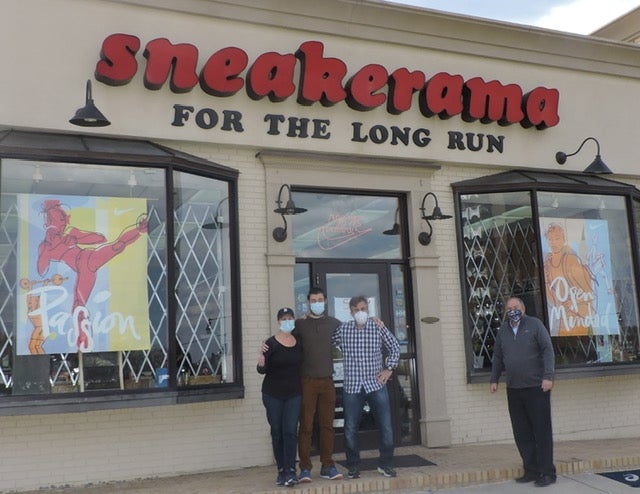As spring and summer lure runners out onto trails and sidewalks, stores like Worcester’s Sneakerama typically plan for their peak season.
Before COVID-19, 2020 seemed to be a year like any other. Sneakerama owners Steve and Lisa Genatossio stocked up on inventory, preparing their Lake Avenue shop for the busy months ahead. But then, the coronavirus pandemic hit, halting the economy and forcing non-essential businesses to shut their doors just as spring officially started. Instead of fitting their customers with new athletic footwear, the Genatossios laid off virtually all of their staff.
With April sales sinking to less than a third of where they were a year prior, Lisa said she scrambled to apply for the $349-billion U.S. Small Business Administration’s Paycheck Protection Program as soon as it was made available on April 3, turning first to Bank of America, where she said she had done business for more than two decades. But that process didn’t go very smoothly. System errors and an overloaded customer service arm stood in her way, she said.
“It kept bouncing back, saying ‘I haven’t been a customer long enough,’” Lisa recalled on Wednesday. When she tried to seek help at a local branch, she said, she was told local Bank of America employees could not help her, directing her to online assistance.
“You couldn’t talk to a person, you couldn’t get an answer through email,” Lisa said. “And then I heard that [PPP] had all dried up and it was gone, and I was just devastated.”
A spokesperson for Bank of America said the bank had designed the entire PPP application process to be online, in part to minimize the risks associated with spreading coronavirus through in-person meetings. Once applications opened up, the bank fielded approximately 10,000 applications an hour.
When the second $310-billion round of PPP funding was announced, the Genatossios decided to try applying for relief through a different bank. They turned to UniBank CEO Michael Welch, who they knew from his time as headmaster of St. John’s High School in Shrewsbury, which their son attended.
This time, the Genatossios said, the process went much more smoothly. Within a day, they had the paperwork they needed to process their second PPP application. The pair declined to share how much money they were approved for, but said Whitinsville-based UniBank approved the full amount they requested.
Without the relief offered through the PPP program, Lisa said, they were left covering all of Sneakerama’s expenses out of their own bank account, including utilities, paying back stock purchases, covering health insurance and utilities. With no other option, they were spending more than they were taking in.
“This really was a lifesaver for us,” Lisa said, of the loan.
Tom McGregor, UniBank’s senior vice president and chief commercial banking officer, said the institution took on a lot of PPP applications unable to be processed elsewhere, for a variety reasons. As of May 5, UniBank has approved 577 loans totaling $106,777,191, with 502 of those loans coming in at less than $350,000, according to Welch.
“In many ways, they represent the heart of us as a community bank,” Welch said of the Genatossios. He explained while Sneakerama wasn’t doing business with UniBank before, he and other members of the bank’s leadership knew them, their role in the community and their character, which eased the process of establishing a new banking relationship.
Now, the Genatossios are trying to focus on the future, working on staying as optimistic as they can in light of an unpredictable economic and regulatory landscape. They’re providing curbside delivery and, recently, tried out hosting a virtual 5K race. They’re also mapping out ways to make their brick-and-mortar location more conducive to social distancing, setting up in-store fitting stations and considering new capacity limits.
“We totally redesigned the store,” Genatossio said.
But even with the business adjustments and the federal assistance, they said, they’re not sure how long they can sustain their operations. Genatossio said he’s hopeful, when the economy picks up again and social distancing requirements ease, more people might discover how social and empowering running can be.
An avid runner himself, he extolled the virtues of a sport many enjoy well into their older years, and lamented all of the races canceled to prevent further spread of the coronavirus. Although he said he fully understood why it was necessary, he’s keeping his eye on a future when runners will not only be able to buy sneakers in person, but gather in person, as well.
“Running is such a way of life,” he said.

